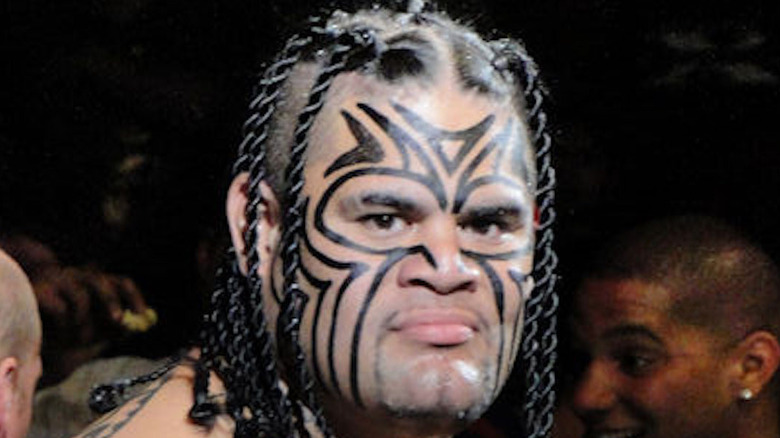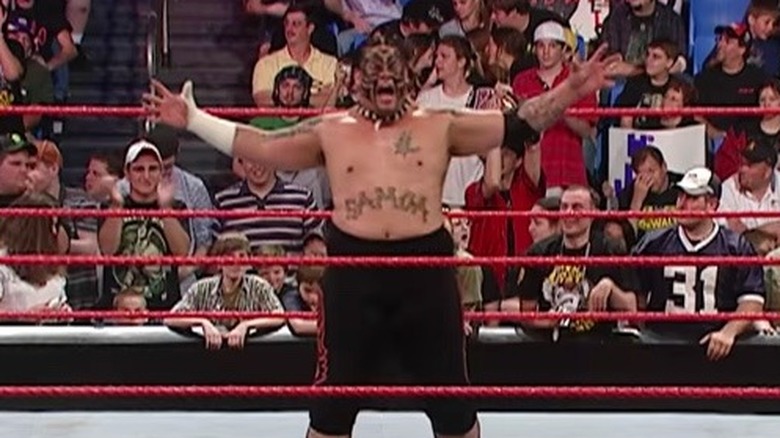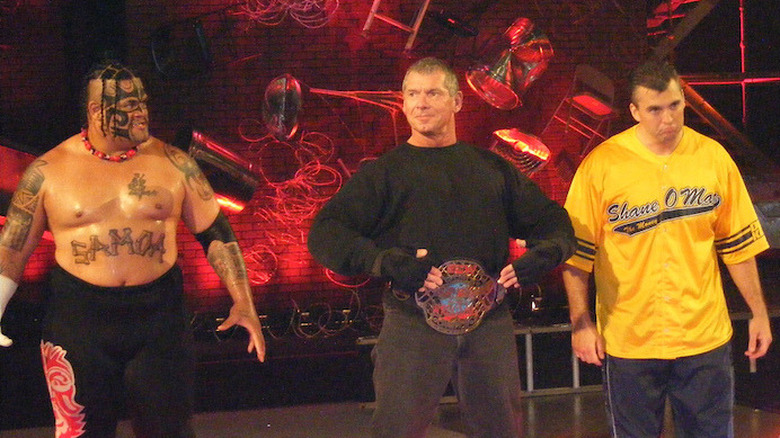Tragic Details Found In Edward 'Umaga' Fatu's Autopsy Report
Edward Fatu, better known to WWE fans as Umaga, was just one of the many members of professional wrestling's Anoa'i family, a clan that includes legends such as the Wild Samoans (Afa and Sika) and The Rock and present-day Superstars like Roman Reigns and Jimmy and Jey Uso. He made his WWE debut in the early 2000s under the ring name Jamal, and was one-half of 3-Minute Warning alongside his cousin Matt Anoa'i, aka Rosey; together, they enjoyed moderate success in the company's tag team division but never won any titles. It was as a singles competitor where he truly broke out, as Fatu was repackaged as Umaga in April 2006 (via Online World of Wrestling) and given a strong push despite his questionable gimmick of a stereotypical Samoan "savage."
During his time in WWE, Umaga was a staple of the promotion's mid-card who won two Intercontinental Championships. He was arguably best remembered as WWE boss Vince McMahon's representative against Donald Trump (who was represented by Bobby Lashley) at the "Battle of the Billionaires" at WrestleMania 23 in 2007; Lashley's victory over Umaga resulted in McMahon getting his head shaved on live television, per the stipulation of their match. However, he was surprisingly released by the company two years later, and on December 4, 2009, he died at the age of 36 after suffering two heart attacks.
More than four months after Edward "Umaga" Fatu's untimely death, his autopsy report was released, revealing some concerning details about his health at the time of his passing.
Umaga died of acute toxicity, according to his autopsy
As shown on Edward "Umaga" Fatu's autopsy (via AutopsyFiles.org), the wrestler's official cause of death was stated as "acute toxicity due to the combined effects of hydrocodone, carisoprodol, and diazepam," with the manner of death listed as accidental. It was also noted that Umaga had a "past medical history of cardiac disease and substance abuse," and that he weighed 406 pounds at the time of his death, making him well overweight for a man who stood 6-feet-6-inches tall. (His WWE profile lists his billed weight at 348 pounds.) There was no evidence found of internal or external injuries that might have contributed to his death.
The pathological diagnoses section of the autopsy provides a closer look at the heart problems Umaga dealt with, specifically hypertensive cardiovascular disease. Under this diagnosis, it is stated that the wrestler suffered from an enlarged heart, with the organ weighing in at 700 grams. That's more than twice the weight of the average adult male heart, which, per LiveScience, is supposed to weigh between 280 and 340 grams. He was also found to have an acute hepatic injury (or "shock liver," as the autopsy describes it) and lung issues, including bronchopneumonia and pulmonary congestion and edema.
Although the autopsy made mention of substance abuse, Wrestling Inc. pointed out that Umaga's death appeared to have resulted from combining painkillers (hydrocodone), a muscle relaxant (carisoprodol), and anxiety medication (diazepam) over a brief period of time, as opposed to the effects of long-term drug abuse finally catching up with the former WWE Superstar.
Umaga violated WWE's Wellness Policy twice before his death
As explained by Bleacher Report, Umaga's drug use was well-documented prior to his death, as he had mostly consumed painkillers and was once caught using marijuana but was known to use other drugs as well. In 2007, he was one of more than a dozen WWE Superstars who were named as clients of Orlando-based Signature Pharmacy, a company that was raided by Florida law enforcement officials for distributing steroids and various prescription drugs (via New York Daily News). This led to his first of two violations of WWE's Wellness Policy and a 30-day suspension, according to Fightful. (His autopsy, quite notably, did not reveal any sign of recent steroid use.)
Umaga's second Wellness Policy violation led to his release from the company; typically, second-time violators of the policy don't get fired yet, but in Umaga's case, he had apparently refused WWE's offer to send him to rehab. It's not clear what type of drugs he tested positive for ahead of his second violation.
Following his death, Umaga's friends and colleagues acknowledged his drug issues but preferred to remember him for the person he was outside the ring. "He had his demons, but he found a lot of strength in his family," former ECW and WWE wrestler Dawn Marie Psaltis told CNN. "He comes from a long line of professional wrestlers and did his family proud."


